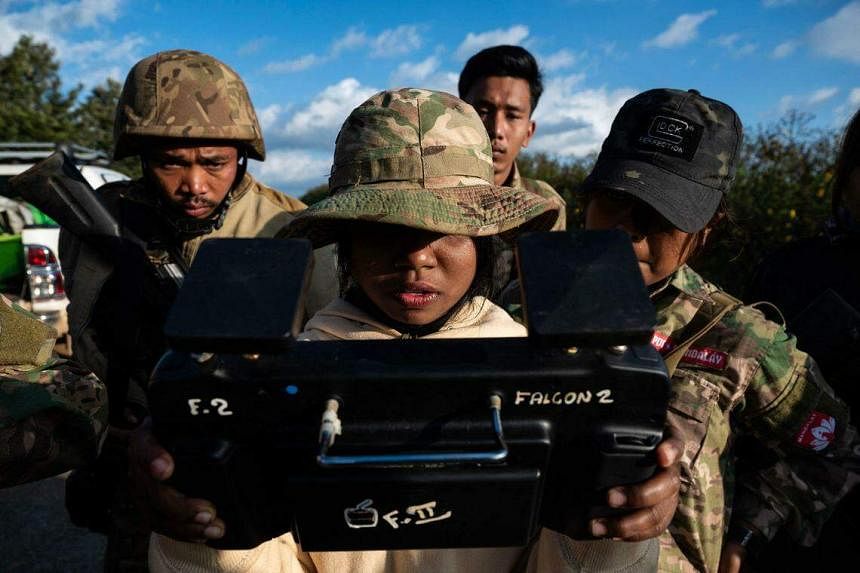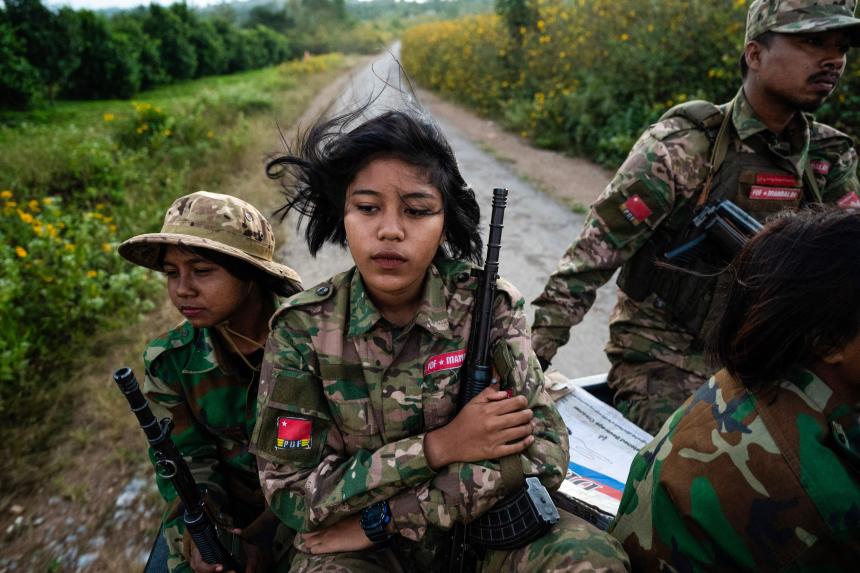SHAN STATE, Myanmar – An 18-year-old recruit in one of Myanmar’s pro-democracy fighting units prepares to launch a drone strike on junta troops, driven by anger and her mother’s call for revolution.
Moe Moe is one of hundreds of women training, living and fighting alongside men in the People’s Defence Forces (PDF), upending gender norms in the mostly Buddhist country.
She grew up during a rare period of democracy in Myanmar and, after the military ended it with a 2021 coup, joined one of the dozens of PDF units that formed to end the junta’s rule.
Moe Moe initially worked with a group organising protests against the military but, after months of the junta’s deadly crackdown, decided to become a fighter.
“I can’t stand the military’s injustice,” she said after carrying out the drone strike in Shan state, which neighbours the more populous Mandalay region.
“They killed innocent civilians. The main reason I joined was because of my anger.”
Moe Moe, wearing the group’s camouflage fatigues and its red peacock badge stitched onto her arm, said she had friends in the Mandalay PDF who invited her to fight with them.
“I was born in Mandalay. I’m a Mandalay girl. So, I joined Mandalay PDF,” she said.
Moe Moe, who uses a pseudonym for security reasons, is one of around 100 women in the Mandalay PDF, which has clashed regularly with the junta in Shan state and Mandalay.
Moe Moe and other women make up around a third of the group’s drone unit, challenging the military’s dominance of the skies by flying commercial drones adapted to carry bombs that can be dropped on junta positions.
“If I drop bombs directly onto a military target, I feel very good for the rest of that day. It motivates me,” she said.
“I want more drone missions and to better show what I can do.”

A male soldier in charge of drone operations Soe Thuya Zaw said his women comrades had proven to be formidable assets.
“We believe in the ability of women. When we were thinking how would be best to use the abilities of female soldiers, we decided that they would be most suited to the drone force,” he said.
‘Come back home’
Women in the Mandalay PDF are also performing a range of other duties, including joining patrols and working as medics.
Wearing combat trousers and T-shirts, female recruits go for morning jogs along dirt tracks, hurried by the sharp blasts of an instructor’s whistle.
Later, they go through a punishing routine of squats and sit-ups before lining up for a meal of rice and meat at the canteen.
Women also work in the administration that keeps the Mandalay PDF funded and fed.
At an office table cluttered with laptops and paper, a group of women are busy at work when another whistle blast announces an air raid drill, and they run, files in hand, to take shelter in a nearby trench.
In another shelter, women sit dismantling and cleaning rifles with rags and oil, keeping the group’s precious arsenal of weapons in good order.
In recent weeks, the Mandalay PDF has joined fighting in Shan state driven by an alliance of three ethnic minority groups.

The uptick in clashes means more work for Mandalay PDF’s female medical staff.
At one health post – consisting of a bed placed outside a house alongside a trolley containing a few bottles – a doctor and nurse change a wounded fighter’s dressing.
Back at the camp in the late afternoon sun, several women sit around a campfire, clothes hanging on lines strung between trees and a clutch of rifles resting against a table.
Two are on patrol duty, and pick up their weapons and head out into the forest as the light dwindles.
They are wearing full camouflage fatigues, plus red lipstick that matches the red badges on their uniforms.
As the night settles in, they gather by the fire to eat by the light of their phones and talk of home.
It is a place Moe Moe often finds herself thinking about – especially the people she has left behind.
“Sometimes I miss home,” she said.
“But every time I talked with my mum on the phone she would tell me, ‘My daughter, we are fine. Just come back home after the revolution.’”
“When I remember her words, I am fine.” AFP

